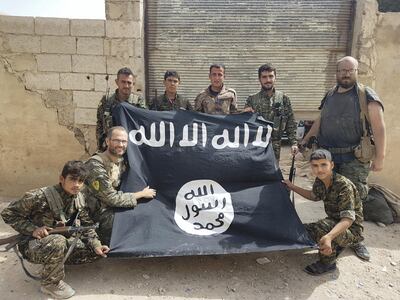Live updates: follow the latest news on Russia-Ukraine
A Briton who fought against ISIS in Syria is using his battlefield experience to prepare a mobile team of volunteer medics to treat civilian casualties of war in Ukraine.
Macer Gifford, 35, who spent three years fighting for the Kurdish militia known as the People’s Protection Units, or YPG, was in Ukraine last month trying to teach first aid to volunteer units before the Russian invasion.
Inspired by the White Helmets — volunteers who helped pull people from the rubble of bombed buildings in Syria — Mr Gifford said he was now planning to repurpose British ex-military vehicles to help civilians wounded in the fighting.
He is one of a number of people planning private medical missions to Ukraine — but one of the few with front-line combat experience as part of an international band of volunteers.
His project remains weeks from fruition but the former financial trader, who fought in Raqqa in 2017, said he already has no shortage of doctors and former military willing to join the mission. During his time in Syria, Mr Gifford secured hundreds of medical kits from the US and set up a medical unit in 2016 to train anti-ISIS fighters and distribute the packs.
“The volunteers are easy to find,” said Mr Gifford. “I need to be sure we have the best equipment for the people to go.”
Mr Gifford also said he had received half a dozen messages from his former colleagues in Syria saying they were either planning or on their way to Ukraine to join an international group of foreigners intending to fight under the Ukrainian flag.
Ukraine’s President Volodymyr Zelenskyy said last week that 16,000 foreigners had volunteered to fight for Ukraine. The numbers heading to Ukraine were unclear, with governments largely advising against travelling to fight for Ukraine. Some have travelled to the border of Poland with the hope of meeting up with other volunteers and joining the battle.
The call to arms has echoes in the units set up to fight on the republican side of the Spanish Civil War — and in Syria where dozens of foreigners died while fighting for the YPG against ISIS.
Mr Gifford said he was in touch with a former colleague in Syria, Aiden Aslin, aged 28, who has been in the country for several years fighting for Ukrainian forces.
Mr Aslin was believed to be under siege in the port city of Mariupol where about 200,000 people are trapped under a heavy Russian bombardment.
His family told a local paper on Saturday that they had not heard from him for days while communications were down in the city.
Mr Gifford’s proposed medical mission is a new front in the volunteering effort — and he warned of the implications for Britons signing up to fight.
Several YPG volunteers were arrested on their return to the UK, and charged with terrorism offences, but none were prosecuted for their role in fighting alongside the group, allies of the UK against ISIS in Syria.
He said that the legal situation could have long-term implications, such as potential travel bans to the US.
Mr Gifford said it was unclear what the status of volunteers would be if they were captured by the Russians. And he warned that injured volunteers faced years of problems without the support of the British Army for rehabilitation and dealing with conditions such as post-traumatic stress disorder.

“Without personal protective equipment, you are exacerbating the chances of being brought back in a body bag or with a serious injury,” he said.
Mr Gifford left Kyiv on a refugee train last week on a 20-hour journey to Budapest after a frustrating week of attempting to set up training sessions for volunteer units.
He said the final session after the invasion started involved handing out hastily-purchased medical kits at a recruitment centre to volunteers who were more concerned about securing guns to defend their homes and city.
“I have seen the extent of Russian activity in Syria,” said Mr Gifford. “Russia used to surround entire cities, entire communities, and bomb them into submission.
“The aim was to weaken the resolve of the fighting population. My fear is that as this drags on, Vladimir Putin is going to get more desperate, more determined and get more violent.”


